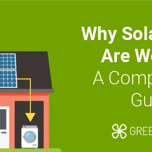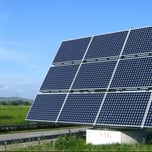Answer these simple questions and we will find you the BEST prices
Which type of solar quotes do you need?
It only takes 30 seconds
100% free with no obligation

Get up to 4 quotes by filling in only 1 quick form

Slash your energy bills by installing solar panels

For the average 2-3 bedroom house
- GreenMatch
- Blog
- 13 Most Asked Questions About Solar Panels
Most Asked Question About Solar Panels - Answered By An Expert

Solar panels have become increasingly popular as more people seek ways to reduce their carbon footprint and energy costs. However, with this rise in popularity comes a surge in questions about their value. The most common question is whether investing in solar panels is worth it.
This article provides all the necessary information to assist you in making an informed decision about the costs and benefits of solar panels. It will answer the most frequently asked questions about solar panels, including how they work, how much they cost, and whether they are worth the investment.
We will also dispel some common myths about solar panels and provide resources for those who want to learn more about this sustainable and cost-effective energy source.

Here we were able to compile of the most frequently asked questions based on Google search volumes that provide insights about solar panels. The top 13 most asked questions are represented by “What”, “Why”, “When”, and ”How”. The questions are answered with the help of Joshua Pearce, Ph.D. He is an expert in solar panels, and with his knowledge, the questions are answered in the best way possible.
Let's go through one after the other from highest to lowest.
1. How do solar panels work? - Search volume: 12,000 per month
Solar panels have revolutionised how we generate electricity, providing a sustainable and renewable energy source. These panels work by converting the power of the sun's rays into usable electricity that can power our homes, businesses, and even vehicles.
Solar panels consist of photovoltaic cells that are made up of layers of silicon and other materials. When sunlight hits these cells, it creates an electric field that generates an electrical current by moving electrons in the silicon. This is done by converting sunlight into electricity through photovoltaic (PV) panels, the most common type of solar panel.
The electricity generated by the solar panels is in the form of direct current (DC), which is not suitable for use in most homes. Therefore, an inverter converts the DC electricity into alternating current (AC) electricity used in homes.
The electricity generated by the solar panels is converted from DC to AC using an inverter. Any electricity not used by the owner can be sent (sold) back to the grid through net metering.

2. How much do solar panels cost? - Search volume: 10,000 per month
The cost of solar panels can vary widely depending on the type of system's size and the installation's location.
A standard 250W solar panel as of 2023 costs £400-£500 but can vary depending on the type and size of the whole system.
One of the most common domestic sizes is a 4kW solar panel system, which costs around £6,400 and will cover around 29 square metres of your roof.
This is without taking solar incentives into account, which can give homeowners back a significant portion of the cost of their system as a tax deduction, reducing the system's net worth. However, this amount is very situational, and everyone should ask their solar panel installer for advice.
Monocrystalline panels offer the best efficiency ratings and energy production but have a higher price tag. Thin-film panels have the lowest pricing and efficiency, making them a good option.
The size of the solar panel system you require is also essential. Larger systems will generate more energy but will cost more. Also, the sunlight in your location can affect your solar panels.
3. How long do solar panels last? - Search volume: 8,000 per month
The solar panel efficiency degrades by 0.5 % annually. After twenty years, the panels still output 80% of their rated power and will continue to provide electricity for many years. However, other parts of the panel can degrade faster. On average, solar panels can last anywhere from 25 to 30 years.
The lifespan of solar panels can vary depending on several factors, including the quality of the panels, the climate in which they are installed, and the amount of maintenance they receive.
The panel’s quality is essential because some cheaper panels may not be as durable as higher-end, premium ones.
While solar panels are built to withstand various weather conditions, extreme temperatures and severe weather (windy, thunder, and lightning) events can impact them. For example, solar panels installed in areas with harsh weather conditions may not last as long as those installed in moderate climates. Regular maintenance can extend the lifespan of solar panels. This should be done once every two years and always once severe weather has passed.
Finally, how the panels are installed can also affect their longevity and ensure they produce energy efficiently. Factors such as the condition of the roof and electrical panels and the overall installation quality can impact their performance.
4. Why are solar panels not worth it? - Search volume: 7500 per month
Despite the many benefits of solar panels, these renewable powerhouses may only be worth it for some. Here are some reasons why it might not be worth it to install them:
- High upfront costs: While solar panel systems are often available for £15,000 or less, your prices could be higher depending on your location, energy usage, and other factors. This can make solar panels a significant investment that may pay off in sixteen to twenty-two years instead of 7-10.
- Low energy usage: If you don't use much electricity, you may not see significant savings from solar panels. If you pay £50 or less monthly for electricity, installing solar probably isn’t worth the time and effort.
- Weather and climate dependence: Clouds, seasonal variations, and obstructions like trees can cause your solar panels to generate less energy. If you live in an area with less sunlight, you may not see significant savings from solar panels.
- Recycling and waste: While solar panels are good for the environment, they can also create waste. The industry’s current circular capacity is woefully unprepared for the waste that is likely to come. The financial incentive to invest in recycling has never been powerful in solar.
- Long payback period: While solar panels can save you money in the long run, recouping your initial investment can take many years. In other words, most homeowners will eventually see a solar power system benefit; it might take decades to realise this.
- Maintenance costs: Solar panels require regular maintenance to ensure they work correctly. This can add to the overall cost of owning solar panels.
- Not suited for all homes: Solar panels are best suited for homes with ample sun exposure throughout the year. If your roof is shaded or doesn't face south, you may not see significant savings from solar panels.
5. How do you get free solar panels from the government? - Search volume: 6,000 per month
Generally speaking, you can't get free solar panels from the government. However, depending on your country and government programs (e.g. tax rebates) may effectively give you free solar panels (e.g. they give you a discount that can be quite generous for buying them).
Some government agencies have created programs subsidising solar panels, but they are only available for low-income households. The agency in charge of the program will filter applications and hire qualified contractors to install solar energy systems. Other government programs may offer discounts on your energy bills. These programs are designed to encourage the use of renewable energy sources.
While you may not be able to get free solar panels from the government, there are some legitimate ways you can lower the upfront costs of solar panels.
You can start by looking into the ECO4 Scheme by the UK government. You can check on the website if you are eligible for the program. You can check your country's website or local authorities for all other grants.
6. How many solar panels do I need? - Search volume: 5,500 per month
The amount of energy the homeowner wants to generate will determine the number of solar panels needed. An average one-bedroom house requires six solar panels, a typical three-bedroom house requires ten panels and a five-bedroom house typically requires fourteen panels.
When deciding how many solar panels you need, there are some key factors to consider to get the most benefits of solar energy.
- The first is the amount of electricity the homeowner wants to generate with solar power. This depends on their current energy consumption and future usage projections. Here, the consideration is the total kilowatt hours (kWh) you currently use or intend to use in your home.
- By analysing historical energy bills and future expectations, homeowners can estimate their average monthly energy consumption and set a target for solar panel generation.
- The second factor to consider is the geographical location and climate conditions. The amount of sunlight a region receives significantly impacts the energy production of solar panels. Areas with more sunlight will require fewer panels to generate the desired electricity than regions with less sunlight. This will provide detailed information about the ideal solar panel capacity based on different areas, ensuring homeowners make informed decisions.
- Another critical consideration is the available roof space. Solar panels are typically installed on rooftops to maximise sunlight exposure. The amount of roof space available determines the total number of solar panels installed. Factors such as roof orientation, shading from nearby structures, and obstructions like chimneys or skylights can affect the number and positioning of solar panels.
In addition to these factors, homeowners should consider their budget and desired ROI (Return on Investment). Solar panels and installation costs vary depending on the system's quality, brand, and size.
Ultimately, the best way to determine how many solar panels you will need is to consult a professional installer. These experts can help you assess your energy usage, the size of your home, and other factors to determine the optimal solar panel system for your needs. With the right strategy, you will enjoy all the benefits of solar energy, including lower energy bills and a smaller environmental footprint.
7. How to clean solar panels? - Search volume: 4,800 per month
Dirty solar panels can reduce their efficiency and output. There are a few ways to clean your solar panels. The best way is to do nothing and let the rain do it for you. Most solar panel systems involve no maintenance.
However, there are exceptions to this rule. If you live in an area with high amounts of smog, dust, dirt, grime, or sand blowing around, you may need to clean them more frequently.
Cleaning is usually relatively simple: try running a hose along the panels to remove dirt or other debris, which is often enough. Cloudy days are best for cleaning, as solar panels get hot in full sun, and the glass can crack if you douse them with cold water.
Here are some tips on how to clean solar panels:
- Shut off your solar panel system before cleaning to ensure your safety and that equipment will not be damaged.
- Use a soft brush or sponge to clean the surface of your dirty solar panels and remove any debris, like dirt and dust. Start gently brushing, as this is the best way to clean solar panels. If much material sits on your solar panels, remove it with a soft brush.
- Rinse the panels with water after brushing to remove any remaining dirt or debris.
- If there are stubborn stains or bird droppings, use a block of biodegradable soap and a soft brush to clean the panels. Avoid using harsh materials or chemicals that can damage the panels.
- After cleaning, monitor energy output to see the difference in efficiency that cleaning has made!
8. How efficient are solar panels? - Search volume: 4,500 per month
To determine solar panel efficiency, called photovoltaic conversion efficiency, we measure how much energy from sunlight is transformed into electricity. Commercial solar panels convert 17-20% of the sun into electricity. While 20% might not sound like a lot, it's enough to keep the average home powered throughout the day.
Although the amount of sunlight can affect their efficiency, modern solar panels are designed to maximise the amount of energy produced. They can even generate electricity on cloudy days, making them a dependable energy source throughout the year. Additionally, regular maintenance, such as cleaning the panels and checking for damage, can help maintain solar panels' efficiency by maximising their full potential.
In general:
- Thin film solar panels range from the teens to low twenty per cent in efficiency.
- Polycrystalline solar panels are in the mid-teens in efficiency.
- Monocrystalline solar panels now dominate the market and are generally over 20% efficient.
9. What are solar panels made of? - Search volume: 3,000 per month
At the heart of every solar panel lies a technology called photovoltaic cells. These cells are the key components responsible for converting sunlight into electricity. The most commonly used material in these cells is silicon, a semiconductor with unique properties enabling it to harness solar energy effectively. Silicon is abundant in nature and can absorb photons from sunlight, releasing electrons.
However, not all solar panels use the same type of silicon. Monocrystalline solar panels, for example, are crafted from the highest-quality silicon wafers. These wafers are carefully extracted from a single, pure crystal structure, resulting in discussions with exceptional efficiency but higher manufacturing costs.
On the other hand, polycrystalline solar panels are made using a less refined form of silicon, which gives them a characteristic blue appearance. While slightly less efficient, polycrystalline panels offer a more cost-effective alternative.
In addition to silicon, solar panels comprise other essential components such as metal frames, tempered glass, and encapsulation materials. Metal frames provide structural support and protection to the panel, ensuring its longevity and durability. Meanwhile, tempered glass is a transparent cover, allowing sunlight to enter while protecting the delicate photovoltaic cells from external elements.
Solar panels often encapsulate us in unique materials such as ethylene-vinyl acetate (EVA) and fluoropolymer back sheets to enhance efficiency and durability. EVA acts as an adhesive layer, bonding the various components of the panel together and protecting it against moisture and UV radiation. Fluoropolymer back sheet, made from materials like Tedlar or TPT, provides additional protection against moisture, heat, and mechanical stress.
10. What are the benefits of solar panels? - Search volume: 1,800 per month
One of the most significant advantages of solar panels is their ability to generate clean and renewable energy, which can help reduce carbon emissions and combat climate change.
Here are some of the benefits of solar panels:
- Financial savings: One of the most significant benefits of solar panels is financial savings. You can reduce or even eliminate your electric bills by generating solar power. The amount you save depends on factors such as your electricity consumption, the size of your solar energy system, and how much power it can generate.
- Environmental benefits: Solar panels are a clean and renewable energy source, producing no greenhouse gas emissions and helping reduce our carbon footprint. Using solar power can reduce our dependence on fossil fuels and contribute to a cleaner environment.
- Increased home value: Installing solar panels can increase the value of your home. Solar panels are viewed as upgrades, like a renovated kitchen or a finished basement, so purchasing a solar energy system will likely increase your home’s value.
- Energy independence: By generating solar power, you become less reliant on your electric utility. This means you can have the ability even during power outages or disruptions.
- Job creation: The solar industry is a growing industry that creates jobs and contributes to the local economy. Going solar can help support local jobs and boost your community.
The benefits of solar panels are undeniable. Solar panels are a game-changer in the quest for sustainable and clean energy solutions, from their positive environmental impact to long-term cost savings. By harnessing the sun's power, we can pave the way for a brighter and greener future for generations to come.
11. When were solar panels invented? - Search volume: 1000 per month
The history of solar panels dates back to the early 19th century when the solar cell was first discovered. The French physicist Edmond Becquerel observed the photovoltaic effect in 1839, which is the ability of some materials to create an electrical charge from light exposure.
However, the first solar panel was invented by Charles Fritts, an American inventor, in 1883. Fritts coated a thin layer of selenium with a fragile layer of gold, which produced cells with an electrical conversion efficiency of only about 1%. This invention led to the launching of a movement for making solar energy.
Finally, in 1954, the first silicon photovoltaic cell was created, and unlike its selenium predecessor, it managed to generate enough electricity to power electrical equipment. The 1980s saw solar panels becoming more efficient and affordable; thus, they began to be used on a larger scale in the United States and Europe. Its solar efficiency only reached 4%, compared to today’s modules, which are over 20%.
12. How big are solar panels? - Search volume: 800 per month
The size of solar panels can vary depending on the manufacturer and the intended use, but some standard sizes are commonly used in residential and commercial installations. It's important to note that the size of solar panels can vary based on their intended use.
For residential solar panels, the standard dimensions are typically around 66 inches by 40 inches, with a frame of about 1.25 inches by 1.6 inches. Each panel usually weighs about 40 to 42 pounds and produces about 300 watts of power each.
Commercial solar panels are typically larger, with dimensions of around 78 inches by 39 inches, producing up to 400 watts of power each.
When considering the size of solar panels, it's important to remember that the panel size does not necessarily correlate with its efficiency. Some of the most efficient solar panels on the market are relatively small.
13. How do solar panels work with your electric bill? - Search volume: 400 per month
Solar panels are a great way to reduce your electric bill, but it's important to understand how they work and what to expect.
The amount you save depends on factors such as the size of your solar installation, whether you have battery storage, your energy consumption, and your electric rates. It's important to note that you will still receive an electricity bill every month, even with solar panels installed.
By generating your electricity, you can reduce or eliminate your dependency on the grid. This means you will consume less electricity from the utility company, lowering monthly bills.
Another key factor that affects your electric bill with solar panels is the concept of “net metering." Net metering allows homeowners with solar panels to receive credit for excess electricity. During times when your panels produce more electricity than you need, the extra power is sent back to the grid, and you receive credits for it. These credits can offset your consumption when your panels are not producing enough electricity, such as at night or during cloudy days.

Inemesit is a seasoned content writer with 9 years of experience in B2B and B2C. Her expertise in sustainability and green technologies guides readers towards eco-friendly choices, significantly contributing to the field of renewable energy and environmental sustainability.

We strive to connect our customers with the right product and supplier. Would you like to be part of GreenMatch?





